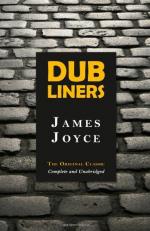“O, now, Mrs. Kernan,” said Mr. Power, “we’ll make him turn over a new leaf. I’ll talk to Martin. He’s the man. We’ll come here one of these nights and talk it over.”
She saw him to the door. The carman was stamping up and down the footpath, and swinging his arms to warm himself.
“It’s very kind of you to bring him home,” she said.
“Not at all,” said Mr. Power.
He got up on the car. As it drove off he raised his hat to her gaily.
“We’ll make a new man of him,” he said. “Good-night, Mrs. Kernan.”
Mrs. Kernan’s puzzled eyes watched the car till it was out of sight. Then she withdrew them, went into the house and emptied her husband’s pockets.
She was an active, practical woman of middle age. Not long before she had celebrated her silver wedding and renewed her intimacy with her husband by waltzing with him to Mr. Power’s accompaniment. In her days of courtship, Mr. Kernan had seemed to her a not ungallant figure: and she still hurried to the chapel door whenever a wedding was reported and, seeing the bridal pair, recalled with vivid pleasure how she had passed out of the Star of the Sea Church in Sandymount, leaning on the arm of a jovial well-fed man, who was dressed smartly in a frock-coat and lavender trousers and carried a silk hat gracefully balanced upon his other arm. After three weeks she had found a wife’s life irksome and, later on, when she was beginning to find it unbearable, she had become a mother. The part of mother presented to her no insuperable difficulties and for twenty-five years she had kept house shrewdly for her husband. Her two eldest sons were launched. One was in a draper’s shop in Glasgow and the other was clerk to a tea- merchant in Belfast. They were good sons, wrote regularly and sometimes sent home money. The other children were still at school.
Mr. Kernan sent a letter to his office next day and remained in bed. She made beef-tea for him and scolded him roundly. She accepted his frequent intemperance as part of the climate, healed him dutifully whenever he was sick and always tried to make him eat a breakfast. There were worse husbands. He had never been violent since the boys had grown up, and she knew that he would walk to the end of Thomas Street and back again to book even a small order.
Two nights after, his friends came to see him. She brought them up to his bedroom, the air of which was impregnated with a personal odour, and gave them chairs at the fire. Mr. Kernan’s tongue, the occasional stinging pain of which had made him somewhat irritable during the day, became more polite. He sat propped up in the bed by pillows and the little colour in his puffy cheeks made them resemble warm cinders. He apologised to his guests for the disorder of the room, but at the same time looked at them a little proudly, with a veteran’s pride.




